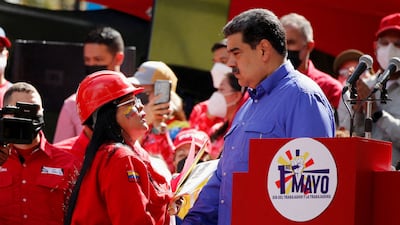US President Joe Biden's administration announced on Tuesday the rollback of some energy sanctions on Venezuela in a move designed to ease oil company Chevron's negotiations with Caracas.
The White House said the easing of sanctions is also aimed at ensuring a commitment from President Nicolas Maduro's government to open a dialogue with the Venezuelan opposition in Mexico City.
Venezuela has been in a state of political and economic upheaval for the past several years, with pre-existing problems exacerbated by hyperinflation, boycotted elections and a failed coup attempt.
The Venezuelan government was expected to announce the resumption of talks with the opposition later on Tuesday, eight months after Mr Maduro walked away from the last round of negotiations.
US officials said the first reversal of sanctions will allow Chevron to negotiate its license with Venezuela’s state-owned oil company PDVSA to continue operations in the country. The reversal, however, is limited and will not allow Chevron to drill or export any petroleum of Venezuelan origin.
“The policy framework for us is that we are focused on promoting a viable dialogue that leads to concrete and ambitious outcomes,” a senior administration official told reporters.
The official added that the move has been co-ordinated with the opposition.
“We will alleviate pressure on the basis of those outcomes and in coordination, very closely, with … the [Venezuela] interim government. We will reapply sanctions on the basis of any steps backward or regresses in any sort of negotiations.”
Washington is also removing Carlos Erik Malpica-Flores, a former PDVSA official and nephew of Venezuela’s first lady Cilia Adela Flores, from a list of sanctioned individuals.
The move follows talks between Washington and Caracas that began in early March. The negotiations gained steam following Russia’s invasion of Ukraine and as the Biden administration started looking for ways to diversify oil input into the global market.
The reversal of other sanctions would be contingent on progress at the talks in Mexico City, US officials said.
“The only path that the regime has towards the alleviation of sanctions” is to participate in peaceful negotiations, the officials said.
Scores of Venezuelans, including the country's attorney general, the head of the penitentiary system and more than 140 entities — among them Venezuela's Central Bank — will remain sanctioned.
The Treasury Department will also continue to prohibit transactions with the Venezuelan government and PDVSA within US financial markets.
Mr Maduro has been indicted in the US and has been accused by the Justice Department of conspiring “to flood the United States with cocaine”.
The US and other countries withdrew recognition of Mr Maduro after he reportedly rigged the 2018 election in his favour.
Instead, they recognised Juan Guaido, the former head of the opposition-dominated National Assembly and the leader of the Unitary Platform.
Venezuela sits on top of the world’s largest oil reserves and was producing almost three million barrels per day before the sanctions.
Tuesday’s announcement marks the second reversal by the Biden administration this week of a Donald Trump-era policy.
On Monday, the White House announced a partial lifting of sanctions on Cuba, authorising the expansion of flights beyond Havana and resuming a programme to reunify Cuban families in the US.
The Associated Press contributed to this report














